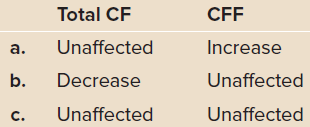Ignoring interest, what is the effect on Virtual Cons total cash flow and cash flow from financing
Question:

Laura Bond is a Senior VP of Media Invests Partners (MIP), a late-stage venture capital firm. MIP is considering an investment in Virtual Con Corp. Virtual Con went public during the dot-com boom, and it currently trades at a small fraction of its IPO value; however, its recent financial statements have shown improvement.
Harry Darling, a former employee of MIP and current Virtual Con board member, thinks that Virtual Con is an excellent candidate to take private. He has presented the idea to MIP€™s board, pointing out the rising operating cash flows. Ms. Bond has the highest regard for Mr. Darling, but she remains dubious about his assessment of Virtual Con. She has come across several items in the footnotes to the financial statements that have raised concerns.
Ms. Bond noticed that six months ago Virtual Con created a special-purpose entity (SPE) to securitize its receivables. The firm sold off $12 million of its accounts receivable in those two quarters, which represented 80 percent of those outstanding and more than five months of revenue. She notes that a change in the default rate assumption and the discount rate at the time of sale caused the fair value of the receivables to exceed book value by $3.8 million, which Virtual Con booked as revenue.
Mr. Darling also points out, €œVirtual Con has become more active in managing its accounts payable. It set up a financial arrangement with its principal bank so the bank makes payments to Virtual Con€™s suppliers on its behalf, and Virtual Con has 90 days to pay the bank. The suppliers are more willing to do business with Virtual Con because they have the assurance of being paid by the bank.€
Financial statements are the standardized formats to present the financial information related to a business or an organization for its users. Financial statements contain the historical information as well as current period’s financial... Accounts Payable
Accounts payable (AP) are bills to be paid as part of the normal course of business.This is a standard accounting term, one of the most common liabilities, which normally appears in the balance sheet listing of liabilities. Businesses receive... Accounts Receivable
Accounts receivables are debts owed to your company, usually from sales on credit. Accounts receivable is business asset, the sum of the money owed to you by customers who haven’t paid.The standard procedure in business-to-business sales is that... Discount Rate
Depending upon the context, the discount rate has two different definitions and usages. First, the discount rate refers to the interest rate charged to the commercial banks and other financial institutions for the loans they take from the Federal...
Step by Step Answer:

Fundamentals of Investments, Valuation and Management
ISBN: 978-1259720697
8th edition
Authors: Bradford Jordan, Thomas Miller, Steve Dolvin





